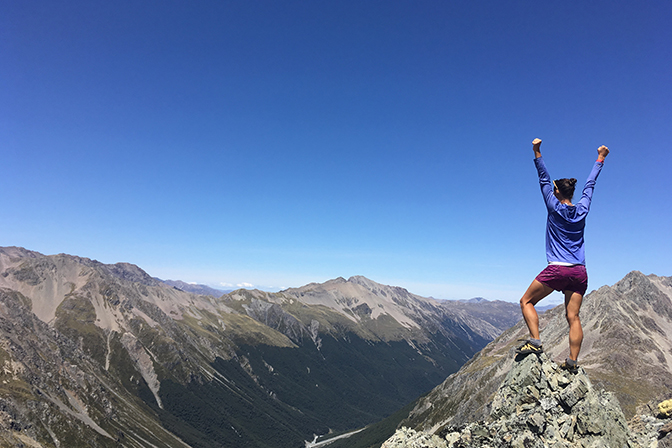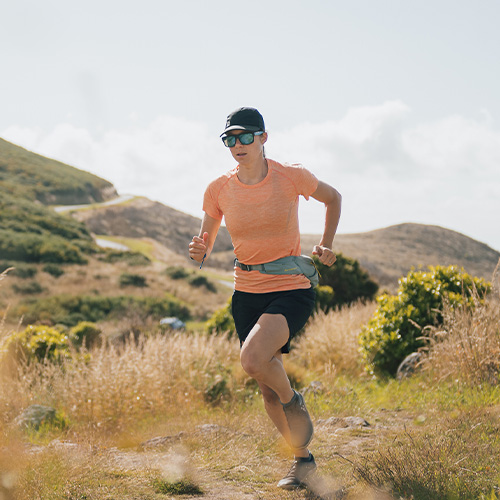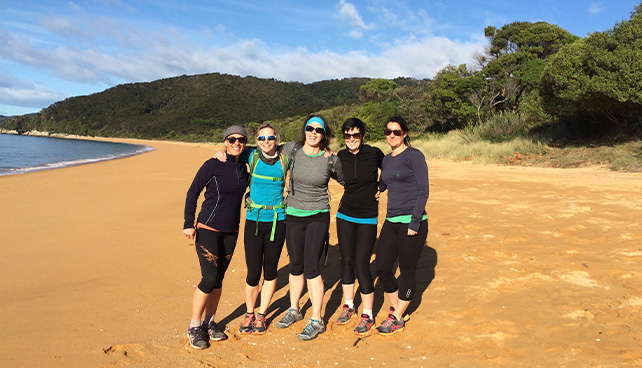
The Te Araroa is a 3000km trail linking Cape Reinga in the North of New Zealand to Bluff in the South. Te Araroa means ‘The Long Pathway’; traversing beaches, rivers, back country bush, cities, settlements, alpine mountain ranges and even white-water rapids. Its beauty is breathtaking, its mud exhausting and its road sections monotonous. On any given day you may wake from your tent with a picture-perfect sunrise, by midday be screaming into wind and horizontal rain as you crest a saddle for the 3rd time and by the evening be sipping hot tea under a million stars.
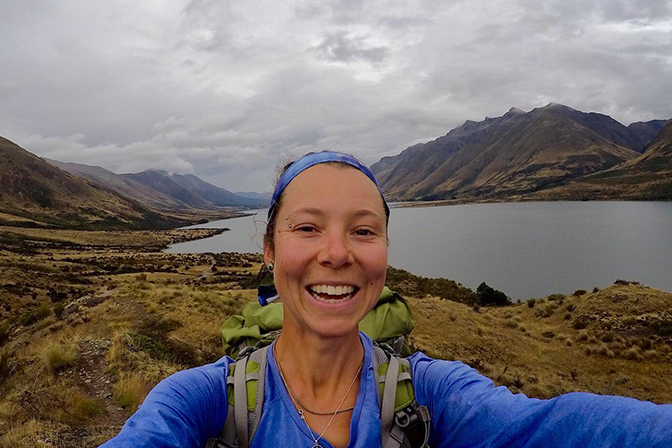
As a physiotherapist who loves to trail run, you’d think I have a pretty good idea about what’s needed to train for an event; good strength and stamina, a positive mindset, commitment to training, coaching support, good recovery etc. This kind of education is a vital part of what I do every day for work, whether to assist individuals returning from injury or even better, helping avoid injury altogether. So, when it came to running a country, I figured in the most part I’d have it nailed. One thing I learnt very quickly is the trail always has the last laugh. Without sounding like the running wounded, I’d like to share a few positive affirmations and realisations I learnt whilst running Aotearoa.
On November 6th 2019, I set out on the adventure of a lifetime. Feeling a little giddy with excitement and waving my goodbyes, I bolted off down the track. I made it precisely 1km before thinking “stuff this”. Ensuring I was out of eye sight from well-wishing onlookers, I had to stop and deal with my first crisis; severe boob jiggle! The pack I had chosen to run with was sold to me in good faith that it was perfect for running, a sales pitch using words like ‘Ultralite Balance Pack’, ‘maestro of body movement’ and ‘superb for runners in multi-day events’ made me confident this was the pack for me. Now fully loaded with weight, the two large front pockets designed for weight distribution, had so much vertical jiggle meant I was having to run with one arm across my chest to control this second set of rouge boobs. Not a good game plan for tackling 90-mile beach. I managed to tie the pockets together and minimise the issue but at the same time became stuck inside my pack…it was going to be a long first day.
My first life ‘boob’/ lesson: Spend time training with your equipment before embarking on your adventure!
First year physio students learn about SMART goals. The perfect goal being Specific, Measurable, Attainable, Realistic and Timed. I achieved my goal of being run-fit ready but totally ignored the specifics of training with 10Kg’s on my back. Weight changes everything from your speed to your entire gait pattern, especially when there’s unexpected jiggle involved!
In all honesty, prior to leaving I had simply run out of time; yes, that old chestnut. My half-weighted pack-trot I’d had at home two days prior to leaving wasn’t enough to highlight the jiggle issue I’d run into or the change in gait from the unfamiliar weight. Or maybe it was, but with time ticking I simply chose to ignore that questioning pit in my stomach.
Eventually I escaped from my pack and managed to tame the jiggle with a nifty piece of string I’d found washed up on the beach. Now all tied up with a lovely red string bow, I looked more like a fancy-dress Christmas gift. In knowing that my body would gradually adapt to my new weight distribution meant I wasn’t particularly phased by my cumbersome change in running style. That is if I hadn’t stubbornly continued running a marathon a day.
So, here’s me slip sliding down Raetea, the highest and most definitely muddiest peak in Northland, with a foot feeling as though it were about to explode from my shoe. From its swelling and creaking, I was too scared that if I removed my shoe I’d never get it back on. By the time I’d reached the outskirts of Omahuta Forest that night, I’d already self-diagnosed; acute extensor tendinopathy. Surprisingly, my foot was pain free without my shoe on, so I did what any person would do and poked the fat bulge with my finger. I squished a smiley face into the swelling to see if a bit of reverse psychology would help matters; thinking at least a happy looking swollen foot might help improve the situation. With a storm on the horizon I had no time for rest and recovery, I had two more forests, one river crossing and an unexpected lost dog to rescue before I’d be home and dry to my old town of Kerikeri.
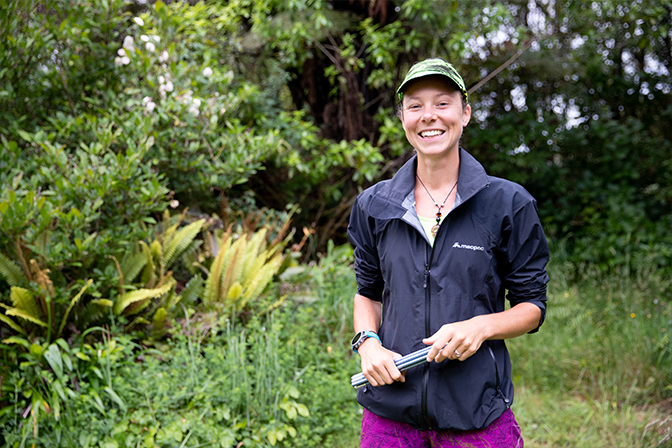
Photo Credit: Tom Lee, @tomleefoto
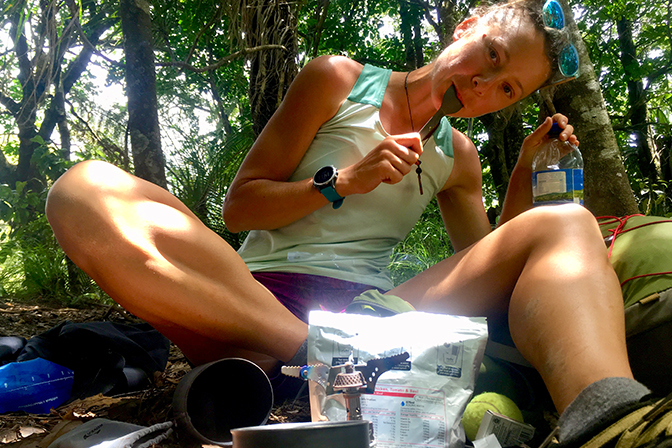
Lesson #2: Training loads.
Only days prior to leaving had I completed my studies in Sports & Exercise Medicine. All the research papers on load management were floating round my head fresh as a daisy. Which in effect makes my antics so much worse, talk about not listening to your own advice! You don’t need post graduate qualifications to know that prolonged excessive loading can lead you toward injury. Overload itself is key to becoming stronger and fitter as gradually your body adapts, however the frequency, intensity and timing is key. Not too little and not too much. There was nothing gradual about me running anywhere between 8-12 hours a day with weight. The phrase boom and bust comes to mind. It was inevitable that eventually something would grind me to a halt.
Having resolved the tendinopathy issues with a temporary reduction in mileage, I gradually returned to full speed ahead. This time with a different pair of shoes that had more breathing space to account for a ‘normal’ amount of daily foot swelling! Upon reaching the Whanganui River, I was over half way down the North Island and even had a couple of ultra-marathons under my belt so was feeling quite fit and strong. With 5 days of canoe paddling ahead, cue realization that what you don’t use, you lose.
All my muscle had gravitated south leaving my puny arms under the command of a paddle with multiple river rapids to navigate. I had a slight panic that my severe lack of upper body strength could jeopardize our entire voyage. Cue Tash, one hell of a gal who’d recently completed an Outward Bound course and of whom I knew I could rely on in assisting me safe and sound down that river. Together we managed to circumnavigate the infamous ‘big rock’ (use your imagination) and ‘50/50’ rapid (named for its 50% capsize rate). I’m proud to say we remained positively buoyant and emerged with muscle definition that ol’ Arnie Schwarzenegger wouldn’t scoff at.
Lesson #3: You assume the postures you spend most time in.
Coming off that river I may have felt as strong as Arnie but physically running, I felt more like a robotic ape. Switching from an erect posture running to sitting for 10 hours a day using my arms, woooo did my hip flexors, shoulders, neck, you name it, tell me about it. Stretching didn’t seem to cut the mustard. Like a tightly coiled spring, whatever position I pulled myself into I’d spring back to my hunched ape look. Time for some self-release dry needling. Something I would not advise if you don’t know what your poking! The short-lived pain of inflicting a few muscle twitches on myself totally outweighed the discomfort running like I needed the loo!
Something I’ve never been very good at is taking time out. This brings me to my fourth life lesson, the need for rest and sleep. In order to save weight, I’d opted to leave my tent’s inner behind. Aware that as noisy and annoying as possums are there’s nothing in the kiwi bush that can actually kill me. However, knowing I was visible to the outside world from under my fly subconsciously spooked me and was not conducive to a restful night’s sleep. In addition, my rather expensive sleeping mat would deflate by the early hours. My sleep was broken at best.
Lesson #4: Sleep = recovery.
Lack of sleep = clouded thoughts, negative self-talk, an inability to make decisions, increased risk of injury and ever-increasing coffee and chocolate consumption. Even for someone burning off copious amounts of calories that routine probably wasn’t so good for the heath of my teeth!
Luckily, living at the base of the Queen Charlotte track, my doorstep is right on the Te Araroa trail. I picked up my tent’s inner while passing through and boy oh boy was I glad of that! Hope Kiwi Lodge, 26km south of Boyle River, had such vast volumes of sand flies they could lead to death through insanity. While south of Mavora Lakes and more specifically Mount Linton Station, mice ran en masse, following a record mast year. My tent’s inner proved a much-needed sanity and security blanket between me and the outside world. Restful sleep ensued, hallelujah!
My ‘life lessons’ so far may seem pretty obvious in hindsight, but when you’re in the thick of it it’s really hard to take a step back and see the forest for the trees. In fact, I look back at all my experiences as positives. If my foot hadn’t slowed progress, I would never have been welcomed into such a beautiful trail family of solo tramping girls nor fully appreciated being housed by trail angles; friends of friends and even complete strangers who share their hearts and homes. It was sitting alone on top of the Waiau Pass in Nelson Lakes National Park that seemed to put life in perspective. The sheer beauty of the alpine peaks that stood before me and the brilliance of Blue Lake that I was leaving behind made me buzz with gratitude. Reflecting on my journey to that point, I reached a heartwarming realization.
Lesson #5: support networks.
It’s too easy to plan a solo adventure and forget how that may affect those most dear to you. Take my husband for example, it takes someone very special to see past the loss of their best playmate for months on end and proudly stand supportive whilst their wifey embarks on making their dream a reality.
Rather than sending my hubby love and appreciation, he’d commonly end up the brunt of ranting phone calls, like the time I was dumbfounded by my own stupidity in getting lost on a golf course. Or the time I issued him a call to arms in being my rescue postal service provider. Never once did he object, and for this I am eternally grateful.
I use the term running ‘unsupported’ loosely. Through the positivity and encouragement shown to me from my friends and loved ones, to awesome kiwi owned companies and even total strangers, I never once felt alone. The joy of running the Te Araroa surpassed even my wildest dreams. With lessons learnt this time round, here’s to making slightly different gaffes on future adventures!
